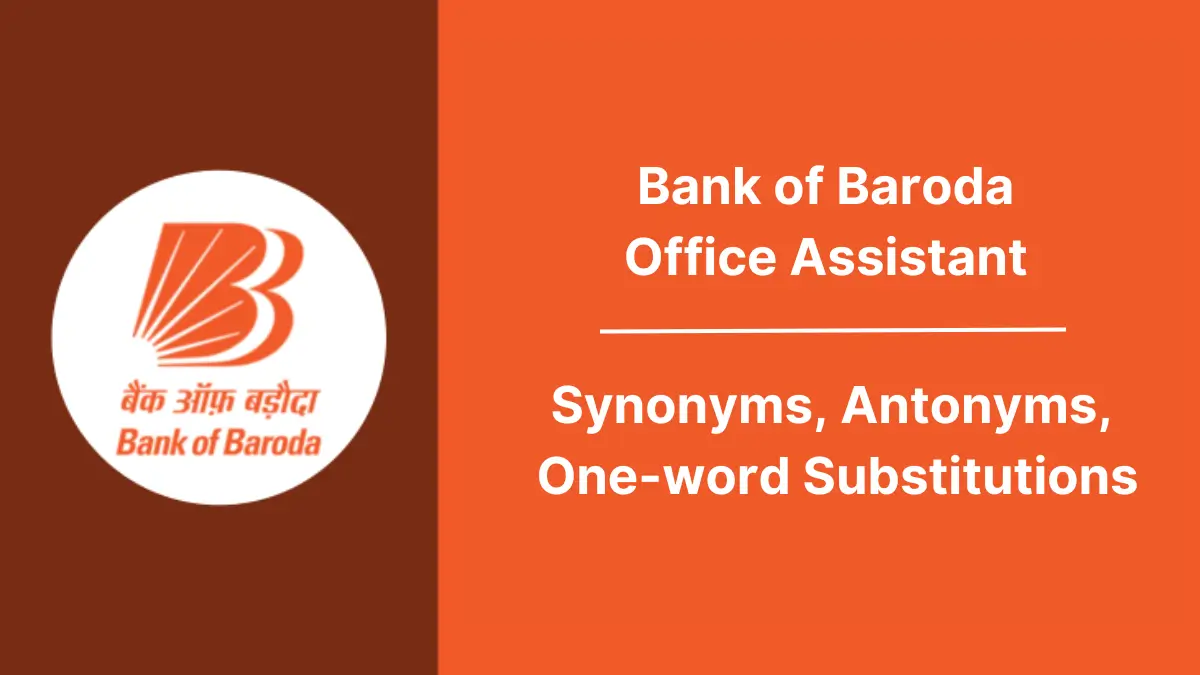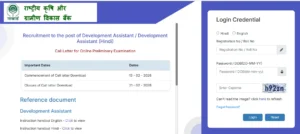The English Language section in the Bank of Baroda Office Assistant Exam 2025 includes vocabulary-based questions like synonyms, antonyms, and one-word substitutions. These questions test how well you understand the meaning of words and how you use them in different contexts. A strong vocabulary not only helps you score well but also improves your overall communication skills.
Synonyms, Antonyms, One-word Substitutions for Bank of Baroda Office Assistant Exam 2025
Vocabulary-based questions may seem small but they can help you score quickly and easily if you are well-prepared. There is no need for long calculations or logic-based solving here just your word knowledge and understanding of meaning. Below are some simple tips and tricks to prepare for synonyms, antonyms, and one-word substitutions for Bank of Baroda Office Assistant 2025 exam.
Tips to Prepare Synonyms
Synonyms are words that have the same or similar meaning. These are commonly asked in the exam and help in improving sentence comprehension.
Examples:
Happy – Joyful, Cheerful, Glad
Begin – Start, Commence, Initiate
Help – Assist, Support, Aid
Fast – Quick, Rapid, Speedy
Important – Significant, Vital, Essential
To prepare for synonyms, you should try to read English newspapers daily and note down any new words you come across along with their meanings. Using a thesaurus or dictionary app will also help you discover alternative words. It is also useful to try forming sentences with the new words so that they become a natural part of your vocabulary. Try to focus on common words that have been asked in previous years’ question papers, as those tend to repeat or follow similar patterns.
Tricks to Prepare Antonyms
Antonyms are words that have opposite meanings. These are direct and easy to solve if your vocabulary is good.
Examples:
Strong – Weak
Victory – Defeat
Truth – Lie
Increase – Decrease
Brave – Coward
To improve on antonyms, you can make a habit of learning a word along with both its synonym and antonym. This helps build word associations that are easier to recall during the exam. Revising opposite word pairs frequently will keep them fresh in your memory. Flashcards are also a good method to test your recall. If antonyms appear in sentence-based questions, always pay attention to the sentence tone or meaning to pick the correct opposite.
Tips to Prepare One-word Substitutions
One-word substitution means replacing a full phrase with one single word. This part of the exam checks how well you can express a longer idea briefly.
Examples:
A person who writes poems – Poet
A place where books are kept – Library
A person who cannot read or write – Illiterate
A life story written by someone else – Biography
One who looks on the bright side of things – Optimist
To prepare for one-word substitutions, try to make your own list of common phrases and their one-word replacements. Revise this list regularly. Many apps and books also provide quizzes or games based on one-word substitutions, which can make learning fun and memorable. Always make sure you understand the full meaning of the phrase before selecting or using a one-word substitute. Regular practice using sample questions and past papers can make a big difference.
Practice is the Key
For all types of vocabulary questions, regular practice is very important. Make a dedicated notebook where you write down new words and revise them weekly. Taking mock tests and solving past year question papers will help you check how much you remember and where you need to focus more. This consistent effort will gradually improve your vocabulary and increase your confidence in solving such questions during the exam.
Use the Words in Daily Life
One of the best ways to remember new vocabulary is to use it in your daily life. Try to include new words in your speech or writing. When you use a word in context, you are more likely to remember it long term. For example, if you learn the word “generous,” say something like “She is very generous with her time” while talking to others. This habit makes learning natural and more effective.




 NABARD Development Assistant Admit Card ...
NABARD Development Assistant Admit Card ...
 Daily Current Affairs Quiz 15th February...
Daily Current Affairs Quiz 15th February...
 Daily Current Affairs and GK Updates (14...
Daily Current Affairs and GK Updates (14...








